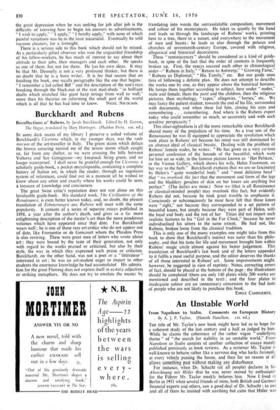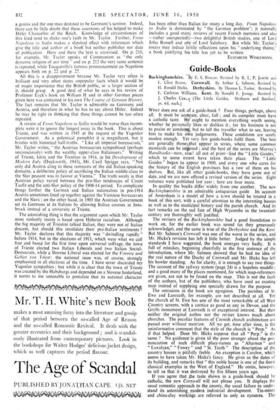An Unstable World
THE title of Mr. Taylor's new book might have led us to hope for a coherent study of the last century and a half as judged by him. While he claims the coherence of the rather vague " underlying theme " of " the search for stability in an unstable world," From Napoleon to Stalin consists of another collection of essays mainly published previously as book reviews. As a reviewer Mr. Taylor is well-known to behave rather like a nervous dog who barks furiously at every vehicle passing the house, and then for no reason at all allows something past without making any disturbance.
For instance, when Dr. Schacht (of all people) declares in his A brechnung mit Hitler that he was never moved by enthusiasm for the Fuhrer Mr. Taylor meekly believes him. Now I lived in Berlin in 1931 when several friends of mine, both British and German financial experts and others, saw a good deal of Dr._Schacht to one and all of them he insisted with anything but calm that Hitler was a genius and the one man destined to be Germany's saviour. Indeed, there can be little doubt that these assertions of his helped to make Hitler Chancellor of the Reich. Knowledge of circumstances of this kind.tend to shake one's faith in Mr. Taylor. Further, From Napoleon to Stalin makes a slipshod effect with references which give the title and author of a boor but neither publisher nor date of publication Here and there the text is unrevised. On p. 210, for example, Mr. Taylor speaks of Communism as " the only dynamic religion of our time " and on p. 212 the very same sentence is repeated, while Tocqueville's famous pronouncement on Napoleon appears both on p. 22 and p. 27. All this is a disappointment because Mr. Taylor very often is brilliant and very often states unpopular facts which it would be of major importance that the Britisti' public, or a larger section of it, should grasp. A good deal of what he says in his review of Professor Eyck's book on William II and in other German pieces given here was contained in his own The Course of German History. The fact remains that Mr. Taylor is admirable on Germany and Austria, and therefore in what he has to say about Hitler. Indeed he may be right in thinking that these things cannot be too often repeated. A review of From Napoleon to Stalin would be worse than incom- plete were it to ignore the longest 'essay in the book. This is about Trieste, and was written in 1945 at the request of the Yugoslav Government. As a polemical pamphlet it is magnificent, but it bristles with historical half-truths. " Like all imperial bureaucrats," Mr. Taylor writes, " the Austrian bureaucrats sympathised (perhaps unconsciously) with the wealthy upper-class Italianisers." Writing of Trieste, Istria and the Trentino in 1914, in his Development of Modern Italy (Duckworth, 1943), ..Mr. Cecil Sprigge says, "Not only did Austria cling to these remnants of the old Italian-speaking domains, a deliberate policy of sacrificing the Italian middle-class to the Slav peasant was in favour at Vienna." The truth surely is that Austrian policy varied between the pro-Slav tendencies of Count Taaffe and the anti-Slav policy of the 1908-14 period. To complicate things further the German and Italian nationalists in pre-1914 Austria sometimes lined up together against the Viennese bureaucrats and the Slays ; on the other hand, in 1903 the Austrian Government set its Germans at its Italians by allowing Italian courses at Inns- bruck instead of a university at Trieste.
The astonishing thing is that the argument upon which Mr. Taylor most violently insists is based upon Hitlerist racialism. Although the big majority of Triestini talked Italian, they were not of Italian descent, but should this invalidate their pro-Italian sentiments ? Mr. Taylor declares that this Majority was " dwindling rapidly " before 1914, but in the elections of 1911, which were what we call free and based for the first time upon universal suffrage, the town of Trieste elected two Italian Liberals and two Italian Social- Democrats, while a Slovene Liberal was elected for the Vororte and Gebiet von Triest: the national issue was, of course, strongly emphasised in all elections of the time. I have never discarded my Yugoslav sympathies ; but while it is clear that the town of Trieste was created by the Habsburgs and depended on a Slovene hinterland, it seems to me untenable to postulate that its national character has been other than Italian for many a long day. From Napoleon to Stalin is dominated by " the German problem"; it naturally includes a good many reviews of recent French memoirs and also —rather unexpectedly—two delightful British studies, one of Lord John Russell and one of Lord Salisbury. But while Mr. Taylor's essays may induce fertile reflections upon his " underlying theme," a book justifying his title has yet to be written.
ELIZABETH WISKEMANN.





































 Previous page
Previous page